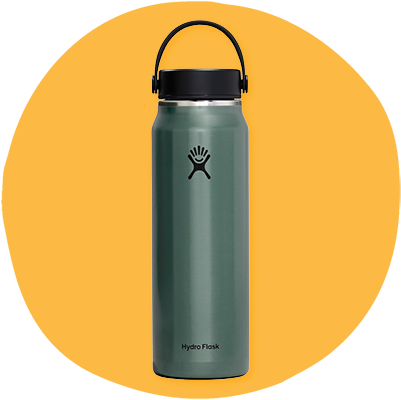| | | I've never been a fan of sports drinks (food dyes have always turned me off), but I do love a coconut water, especially when the weather is hot or I've been sweating a lot. But are any electrolyte drinks actually necessary for staying hydrated? We invited Jessica Sandoz, a registered dietitian at Healthline, to fill us in. | | | | | | | Bottoms up!
Ginger Wojcik
Newsletter Editor, Healthline |  | | Written by Ginger Wojcik
April 17, 2025 • 3.5 min read | | | |  | | | | Q: | Do you really need to drink electrolytes? Or do we get those nutrients from food? | | | A: | The short answer is that you can meet your electrolyte needs through a nutritious diet.
Electrolytes — including sodium, potassium, and magnesium — are essential for various physiological functions, including maintaining fluid balance, supporting nerve and muscle function, regulating pH levels, and facilitating cellular processes.
Sports and rehydration drinks (think: Gatorade, Vitamin Water, Pedialyte) are marketed as products that can help you meet your electrolyte needs. However, with the exception of certain circumstances (which we talk more about below) you do not need these beverages. Most people easily get enough electrolytes by eating a balanced diet that includes many fruits, vegetables, legumes, and nuts.
For instance, here's how much of each electrolyte we need, and how much we usually get daily: - Sodium: 1,500 milligrams (mg). This is easily achieved, as just a teaspoon of table salt has 2,300 mg of sodium.
- Chloride: 2,300 mg. Salt is the main source of chloride in the diet. That same teaspoon of salt has 3,400 mg of chloride. It is also found in small amounts in meat and seafood.
- Potassium: 3,400 mg for men and 2,600 mg for women. Achieve this by eating fruits, veggies, beans, lentils, meat, fish, poultry, and dairy. Most food groups contain potassium!
- Calcium: 1,000 to 1,300 mg. Consume a variety of dairy products; fortified soy, almond, coconut, or oat milk; soybeans; and other high calcium veggies, such as leafy greens.
- Magnesium: 400 to 420 mg for men and 310 to 320 mg for women. It is found in legumes, whole grains, dairy, beans, nuts, and seeds.
Plus, your body is better able to absorb and use electrolytes via food (as is the case with all nutrients), anyway.
Sports and rehydration drinks also tend to contain added sugar, which many people already consume too much of daily.
In some cases, though, it can be beneficial to replace lost electrolytes. These include: - heavy sweating from exercise or outdoor work in excessive heat
- illnesses that cause vomiting or diarrhea
- medications (like certain diuretics) or conditions that cause electrolyte imbalances (like kidney disease)
- restrictive diets where entire food groups are eliminated, such as the keto diet
In serious cases, electrolytes may be administered via an IV in a medical setting. Otherwise, you can replace electrolytes at home by drinking these beverages: - cow's milk
- 100% fruit juice
- coconut water
- sports drinks
- oral electrolyte solutions, like Pedialyte
| | | | | Jessica Sandoz, Registered Dietitian | | | Want to learn more about food, diets, cooking, or some other nutrition subject? Let us know at nutritionedition@healthline.com and we'll look into it for you! (Heads up, we may use your response in an upcoming newsletter.) | | | | | | | Hydrate light | | | | |  | | Hydro Flask Wide Mouth Trail Series | | I have many water bottles, but this is the only one that fits in my car's cup holder. It's my most lightweight vessel, so I always take it with me on hikes. Stainless steel is my top choice for water bottle material because it cleans easily, lasts a very long time, and doesn't cause any weird tastes. 10 out of 10 would recommend! | | | | Every product we recommend has gone through either Healthline's or Optum Now's vetting processes. If you buy through links on this page, we may receive a small commission or other tangible benefit. Healthline has sole editorial control over this newsletter. Potential uses for the products listed here are not health claims made by the manufacturers. Healthline and Optum Now are owned by RVO Health. | | | | | | | | | | | | | | What we're digesting | | 🩺 Why it's worth starting MS treatment early. Learn how early intervention can slow the progression of the disease. | | 🔴 Your 5-minute read on 'inflamm-aging.' Plus, important tips for preventing it. | | ⚠️ Warning signs and symptoms of early stage diabetes. This condition may not produce any noticeable effects to start. | | 🫂 What it feels like to have a bipolar manic episode. "The first time I became manic, I was awake for 3 days straight." | | | | | How did you feel about this newsletter? | | | | | Email nutritionedition@healthline.com with comments related to this newsletter or topics you'd like to see in future editions. The newsletter editors read every message that lands in our inbox — yes, really! We look forward to hearing from you. | | | | Until next time, |  | Take care of yourself, and we'll see
you again soon! | | | | |  | | This edition was powered by | | balance.️ | | | | |


No comments:
Post a Comment